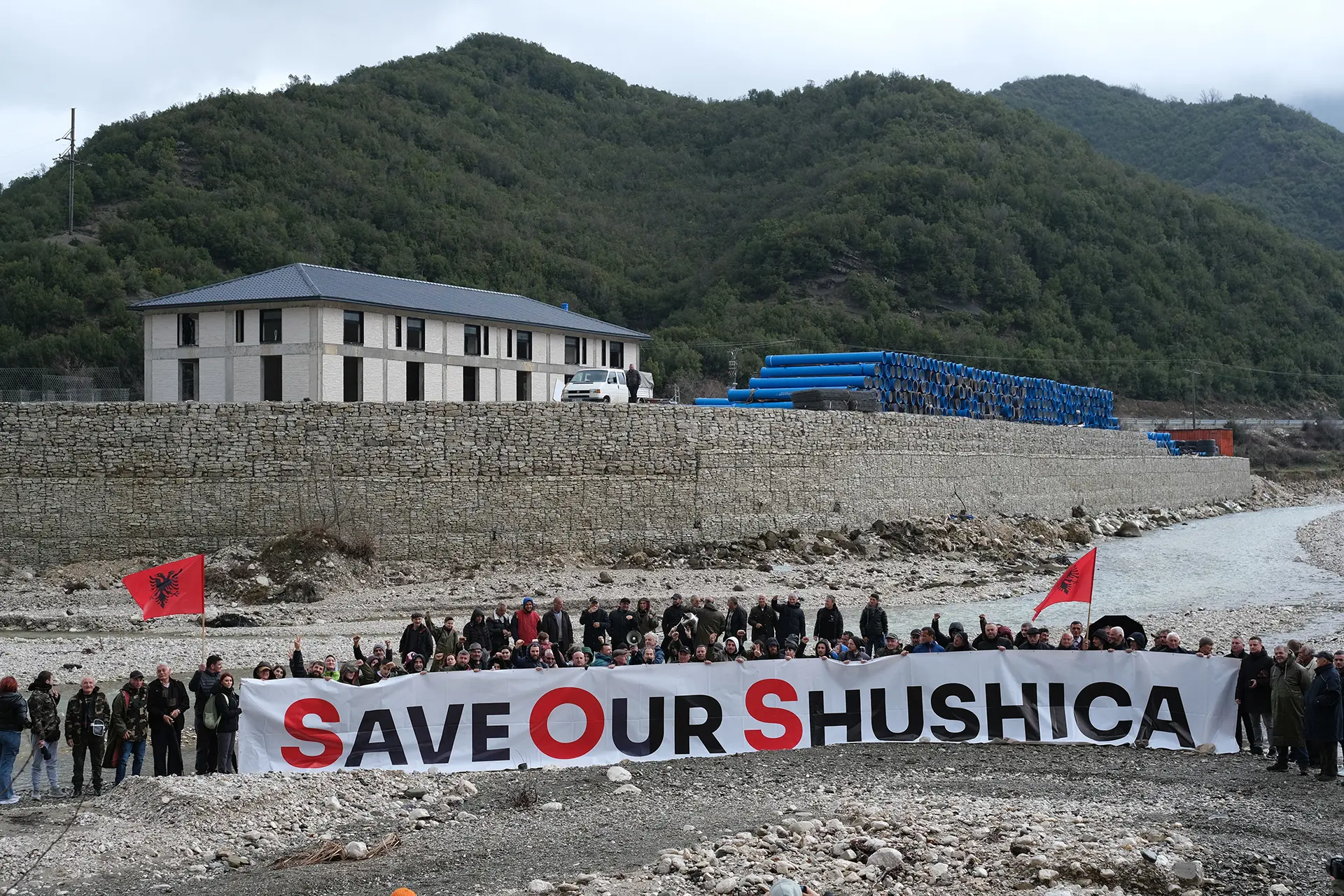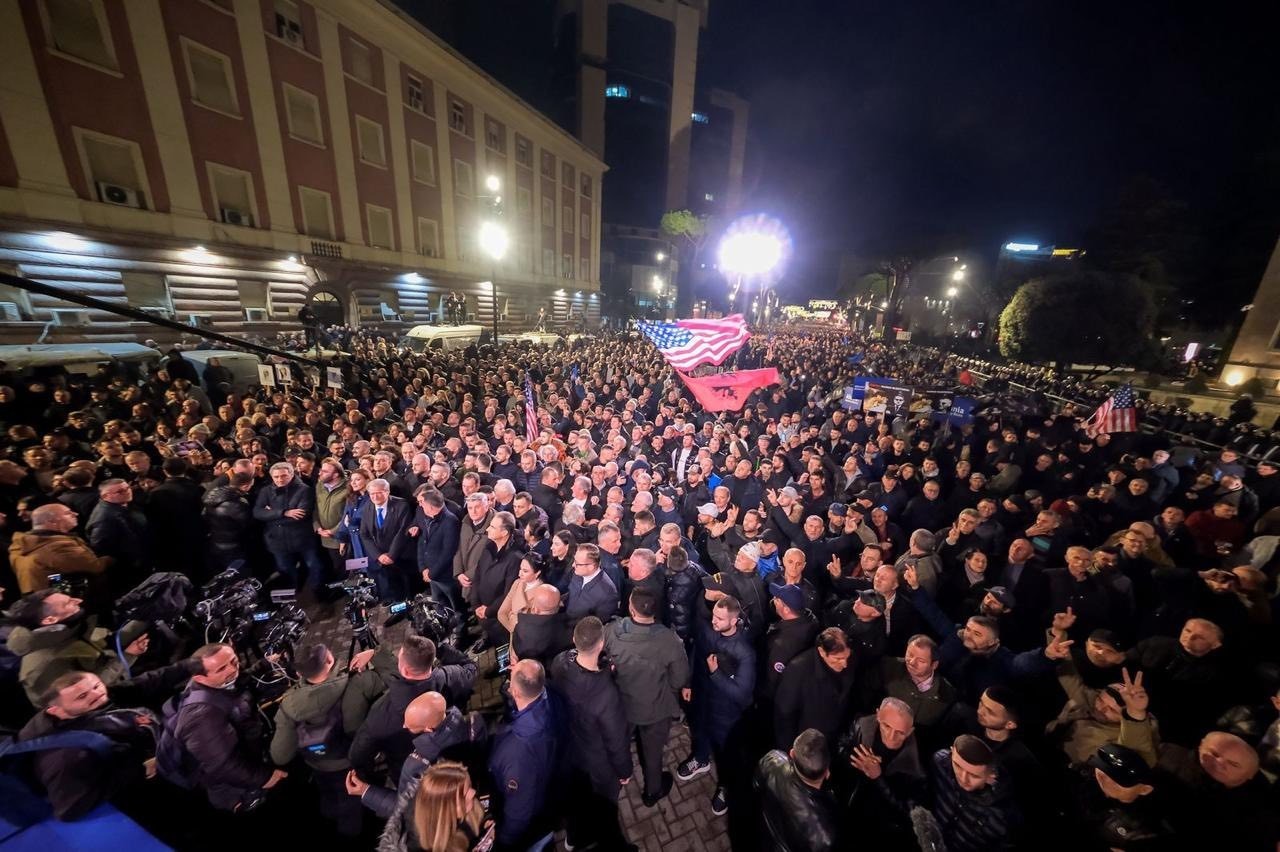The battle for the Shushica Valley
In Albania, when the protection of the Vjosa river and its tributaries seemed almost guaranteed, a project aimed at tourism development has once again called everything into question, threatening an area with a population of over 50 thousand people

La-battaglia-per-la-valle-della-Shushica-1
Protests in Shushica - photo Nensi Bogdani
Nowadays, in Tirana it is increasingly difficult to be struck by something in particular. The city never sleeps, it constantly changes like an endless construction site. However, on 25 May, even the inhabitants of the Albanian capital, by now accustomed to everything, must have been surprised by the arrival of a van carrying an enormous blue tube, covered in signatures, which was then placed in front of the headquarters of the Albanian government.
The pipe arrived from the valley of one of the tributaries of the Vjosa, the Shushica river, to bring to the politicians of the capital – as the protagonists of the initiative say – the "tears" of over 50,000 inhabitants of the 37 villages in the area crossed by the river. The protest broke out because the Albanian government decided it didn’t know what to do with all that water in the valley. By building a special aqueduct that draws directly from the source of the river, it is preferred to supply the homes of tourists in Himarë, one of the symbolic locations of the Albanian boom, which recorded ten million foreign visitors in 2023, marking a 33% increase compared to the previous year. All this without ever having asked the residents’ opinion.
Ilia is at work in his fields, where he comes every day to cultivate the family land after finishing work at the school in the village of Selenicë, where he teaches history and geography. "We are a story within a story”, he says. "We are almost five thousand people from the Aromanian minority, that is, the Romanians from Albania. We descend from the Romans who crossed these lands, custodians of the Via Egnatia which still unites us. And our name ties us to destiny: here is all the asphalt used in the world. First the Turks, then the Italians who built the first railway to connect the mines to the sea and who in 1943, as occupiers, were attacked by Albanian partisans. This is a land of partisans, of people used to fighting. And to be disappointed by those in power. Our asphalt is exported all over the world, but to have an asphalt road between our villages we had to wait until the last elections”.
Ilia is one of the leaders of the protest. "We are fighting, we have appealed to the court because the procedures for carrying out the so-called ‘consultations with the local community’, required by law, were rigged. The lists of names of the people summoned were prepared by the local leaders of the Socialist Party [which governs in Tirana, ed.] and almost all of the people were from Himarë. But it is our water that they are stealing, after coming here for years to promise investments and development, convincing us not to emigrate, to stay on our land. Here everyone is in debt, we have farms, beekeeping, olive trees, vineyards. Now what will we do? There has been less and less water for decades now. We were born and raised here, so we know better than anyone that the water flow has dramatically decreased. Creating a deviation from the source means killing this valley and the dreams of its 50,000 inhabitants”.
Ilia and other residents launched the campaign Save our Shushica , slogan that also stands out on the banner that welcomes those arriving in Brataj, another village in the valley. Hysni is waiting for us in front of one of the two bars in the village. Retired a few years ago, he is another protagonist of the demonstrations and interviews that the inhabitants of the valley continue to carry out, relentlessly, trying to stop the project.
"We made the first technicians who came to carry out surveys for the aqueduct run away”, says Hysni, laughing. "I used to be a socialist, but not anymore. Politics has nothing to do with this story. They accuse us of being manipulated by the opposition, but that’s not true. We fight because we are tired of this subservience to power. In some ways, it seems that communism has never ended. They must stop doing what they want. Sustainable tourism can also be developed here, this is a splendid region, there are the ruins of Amantia, there is nature. Why take away water from us to fuel mass tourism on the coast? In Himarë there is enough water, they have no need for water for civil uses, but only to attract even more tourists”, comments Hysni.
Behind him, the two bars and the village post office begin to lower the shutters. "See? There’s a funeral, we are all going. We have known each other forever, we are a real community. We are our river and our valley. As was the case with Vjosa, we will fight and win”.
The campaign against the construction of dozens of small hydropower plants along the Vjosa, the last "free" European river, has marked years of struggle in Albania. Like the local community in the Valbona river area, in northern Albania, the population of the Vjosa valley also opposed speculative projects that risked damaging their waterways.
"After Vjosa was proclaimed a national park (in March 2023, ed.), we felt safe. But it was just an illusion", explains Hysni. "They cheated. In Tirana they said that the decree establishing the Vjosa National Park does not include its tributaries, such as the Sushica river. Then they changed their mind, stating that it includes the tributaries, specifying however that the project can still be done since it was approved before the creation of the national park. A bit like they did in Valbona, where they are building an airport in the heart of the park, claiming that there was a variant to the natural park project. They lie, they always lie. They are also lying about the water flow rate of the Sushica. They are using old analyses, which we have already challenged thanks to private consultants. We ask that the water flow rate be calculated by independent experts. And we will not stop fighting", concludes Hysni before saying goodbye and joining the funeral procession.
The residents’ committees were joined not only by activists from Tirana and other areas of the country, but also by an international network born from the campaign Save the Blue Heart of Europe that united regional battles against hydroelectric plants. The outcome is by no means a foregone conclusion, but the work has begun: by night, before justice is pronounced. It is a race against time, but the people of Shushica will not stop.
This article was produced within the framework of the Collaborative and Investigative Journalism Initiative (CIJI ), a project co-funded by the European Commission. Responsibility for the contents of this article lies with Osservatorio Balcani Caucaso Transeuropa and does not in any way reflect the opinion of the European Union. Go to the project page
The battle for the Shushica Valley
In Albania, when the protection of the Vjosa river and its tributaries seemed almost guaranteed, a project aimed at tourism development has once again called everything into question, threatening an area with a population of over 50 thousand people

La-battaglia-per-la-valle-della-Shushica-1
Protests in Shushica - photo Nensi Bogdani
Nowadays, in Tirana it is increasingly difficult to be struck by something in particular. The city never sleeps, it constantly changes like an endless construction site. However, on 25 May, even the inhabitants of the Albanian capital, by now accustomed to everything, must have been surprised by the arrival of a van carrying an enormous blue tube, covered in signatures, which was then placed in front of the headquarters of the Albanian government.
The pipe arrived from the valley of one of the tributaries of the Vjosa, the Shushica river, to bring to the politicians of the capital – as the protagonists of the initiative say – the "tears" of over 50,000 inhabitants of the 37 villages in the area crossed by the river. The protest broke out because the Albanian government decided it didn’t know what to do with all that water in the valley. By building a special aqueduct that draws directly from the source of the river, it is preferred to supply the homes of tourists in Himarë, one of the symbolic locations of the Albanian boom, which recorded ten million foreign visitors in 2023, marking a 33% increase compared to the previous year. All this without ever having asked the residents’ opinion.
Ilia is at work in his fields, where he comes every day to cultivate the family land after finishing work at the school in the village of Selenicë, where he teaches history and geography. "We are a story within a story”, he says. "We are almost five thousand people from the Aromanian minority, that is, the Romanians from Albania. We descend from the Romans who crossed these lands, custodians of the Via Egnatia which still unites us. And our name ties us to destiny: here is all the asphalt used in the world. First the Turks, then the Italians who built the first railway to connect the mines to the sea and who in 1943, as occupiers, were attacked by Albanian partisans. This is a land of partisans, of people used to fighting. And to be disappointed by those in power. Our asphalt is exported all over the world, but to have an asphalt road between our villages we had to wait until the last elections”.
Ilia is one of the leaders of the protest. "We are fighting, we have appealed to the court because the procedures for carrying out the so-called ‘consultations with the local community’, required by law, were rigged. The lists of names of the people summoned were prepared by the local leaders of the Socialist Party [which governs in Tirana, ed.] and almost all of the people were from Himarë. But it is our water that they are stealing, after coming here for years to promise investments and development, convincing us not to emigrate, to stay on our land. Here everyone is in debt, we have farms, beekeeping, olive trees, vineyards. Now what will we do? There has been less and less water for decades now. We were born and raised here, so we know better than anyone that the water flow has dramatically decreased. Creating a deviation from the source means killing this valley and the dreams of its 50,000 inhabitants”.
Ilia and other residents launched the campaign Save our Shushica , slogan that also stands out on the banner that welcomes those arriving in Brataj, another village in the valley. Hysni is waiting for us in front of one of the two bars in the village. Retired a few years ago, he is another protagonist of the demonstrations and interviews that the inhabitants of the valley continue to carry out, relentlessly, trying to stop the project.
"We made the first technicians who came to carry out surveys for the aqueduct run away”, says Hysni, laughing. "I used to be a socialist, but not anymore. Politics has nothing to do with this story. They accuse us of being manipulated by the opposition, but that’s not true. We fight because we are tired of this subservience to power. In some ways, it seems that communism has never ended. They must stop doing what they want. Sustainable tourism can also be developed here, this is a splendid region, there are the ruins of Amantia, there is nature. Why take away water from us to fuel mass tourism on the coast? In Himarë there is enough water, they have no need for water for civil uses, but only to attract even more tourists”, comments Hysni.
Behind him, the two bars and the village post office begin to lower the shutters. "See? There’s a funeral, we are all going. We have known each other forever, we are a real community. We are our river and our valley. As was the case with Vjosa, we will fight and win”.
The campaign against the construction of dozens of small hydropower plants along the Vjosa, the last "free" European river, has marked years of struggle in Albania. Like the local community in the Valbona river area, in northern Albania, the population of the Vjosa valley also opposed speculative projects that risked damaging their waterways.
"After Vjosa was proclaimed a national park (in March 2023, ed.), we felt safe. But it was just an illusion", explains Hysni. "They cheated. In Tirana they said that the decree establishing the Vjosa National Park does not include its tributaries, such as the Sushica river. Then they changed their mind, stating that it includes the tributaries, specifying however that the project can still be done since it was approved before the creation of the national park. A bit like they did in Valbona, where they are building an airport in the heart of the park, claiming that there was a variant to the natural park project. They lie, they always lie. They are also lying about the water flow rate of the Sushica. They are using old analyses, which we have already challenged thanks to private consultants. We ask that the water flow rate be calculated by independent experts. And we will not stop fighting", concludes Hysni before saying goodbye and joining the funeral procession.
The residents’ committees were joined not only by activists from Tirana and other areas of the country, but also by an international network born from the campaign Save the Blue Heart of Europe that united regional battles against hydroelectric plants. The outcome is by no means a foregone conclusion, but the work has begun: by night, before justice is pronounced. It is a race against time, but the people of Shushica will not stop.
This article was produced within the framework of the Collaborative and Investigative Journalism Initiative (CIJI ), a project co-funded by the European Commission. Responsibility for the contents of this article lies with Osservatorio Balcani Caucaso Transeuropa and does not in any way reflect the opinion of the European Union. Go to the project page













